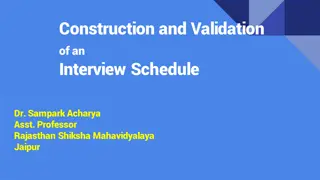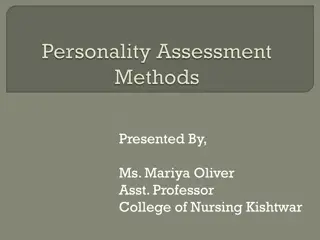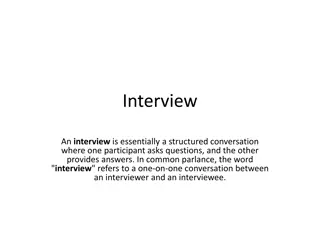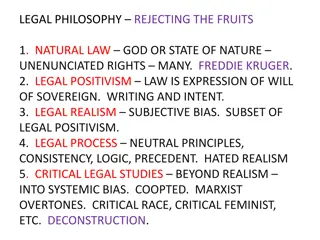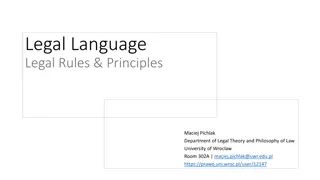Basics of Legal Interviews
Learn the essentials of conducting lawful interviews in the legal field, including federal laws, what questions to ask, and what not to ask. Discover the intricacies of avoiding discriminatory practices and ensuring compliance with regulations. Equip yourself with the knowledge needed to hire the best candidates while staying within legal boundaries.
Download Presentation

Please find below an Image/Link to download the presentation.
The content on the website is provided AS IS for your information and personal use only. It may not be sold, licensed, or shared on other websites without obtaining consent from the author.If you encounter any issues during the download, it is possible that the publisher has removed the file from their server.
You are allowed to download the files provided on this website for personal or commercial use, subject to the condition that they are used lawfully. All files are the property of their respective owners.
The content on the website is provided AS IS for your information and personal use only. It may not be sold, licensed, or shared on other websites without obtaining consent from the author.
E N D
Presentation Transcript
Basics of Legal Interviews
Basics of Legal Interviews WELCOME! 2
Introduction Hiring the best candidate for every job is a goal all employers share. A critical part of the hiring process is the personal interview. While you, as an interviewer, would like to have all the information you can obtain from a candidate, you must avoid asking any question that may be considered discriminatory. The costs for an employer to defend itself against a claim of illegal discrimination are significant. This presentation provides hiring managers with the information they need to know about how to conduct lawful interviews. 3
Agenda Federal laws What to ask and not to ask Volunteered information Consistency 4
Federal Laws Title VII of the Civil Rights Act of 1964 Race Sex Color Nation of origin Religion Age Discrimination in Employment Act (ADEA) Americans with Disabilities Act (ADA) Immigration Reform and Control Act (IRCA) Citizenship Nation of origin 5
Federal Laws (cont.) Genetic Information Nondiscrimination Act (GINA) Genetic information National Labor Relations Act (NLRA) Union membership Uniformed Services Employment and Reemployment Rights Act (USERRA) Membership or service in the uniformed services Bankruptcy Act Consumer Credit Protection Act (CCPA) Wage garnishments 6
What to Ask and Not to Ask - Age Age: Instead of: When did you graduate? When do you intend to retire? Ask: Do you meet the minimum age requirements for the job? Can you supply transcripts of your education? 9
What to Ask and Not to Ask - Disability Disability: Instead of: Do you have a disability? Have you ever filed a workers compensation claim? Do you have a history of drug or alcohol abuse? Ask: Can you perform the duties listed in the job description, with or without accommodation? If a worker has an obvious disability or reveals a hidden disability, you may ask the applicant to describe or demonstrate how he or she would perform job duties. Employers must provide reasonable accommodation to candidates who have disabilities. 10
What to Ask and Not to Ask - Race Race: Questions about race during an interview are prohibited. However, race is often legitimately needed for affirmative action purposes or to track applicant flow. One way to obtain racial information and simultaneously guard against discriminatory selection is for employers to use a Form EEO-1, Voluntary Self-Identification. Employers must keep a completed Form EEO-1 separate from the application and not share the information on it with others or consider the information during the selection process. 11
What to Ask and Not to Ask - Religion Religion: Employers may ask questions and receive information about religion only when a bona fide occupation qualification exists, such as when hiring a clergy person for a religious establishment. 12
What to Ask and Not to Ask Sex/Marital Status Sex/marital status: Instead of: Are you married? When do you plan to start a family? Do you have children? Ask: Are you available to travel as required by the job description? Can you work overtime with little or no notice? Can you work evenings and weekends? 13
What to Ask and Not to Ask National Origin/Citizenship National origin/citizenship: Instead of: Are you a citizen of the U.S.? What country are you from? Where is your accent from? What nationality is your last name? When does your visa expire? Ask: If you are hired, are you able to provide documentation to prove that you are eligible to work in the U.S.? 14
What to Ask and Not to Ask Military Service Military: Instead of: Please provide the status of your military discharge. Will you miss work to perform military service? Ask: What experience did you gain in the uniformed service that is relevant to the job you would be doing? 15
What to Ask and Not to Ask Arrests and Convictions Arrests and convictions: Instead of: Have you ever been arrested? Ask: Have you ever been convicted of a felony? (You must qualify this question by stating that a conviction will not automatically disqualify a candidate. Additionally, the timing of asking this question may be governed by state law). 16
What to Ask and Not to Ask Arrests and Convictions The U.S. Equal Employment Opportunity Commission (EEOC) guidance on employer use of criminal background checks requires employers to conduct an individualized assessment of an employee or applicant s criminal history to determine if the person s criminal background is job- related. Blanket policies or practices of excluding individuals with criminal records are not permitted. While the EEOC guidance does not prohibit employers from considering criminal information during the hiring process, it does require employers to take steps to prevent discrimination under Title VII of the Civil Rights Act of 1964. 17
Volunteered Information Even when you ask only legal questions during an interview, you may receive information you would prefer not to know from applicants who make such a disclosure voluntarily. For example, an applicant may disclose that she is pregnant and will need time off for childbirth if she is hired. The best way to handle this situation is not to pursue it and not make any note of it. Just as you should ask only job-related questions, you must disregard any information the applicant voluntarily discloses that is not related to the job. 19
Consistency To be sure that you obtain the same information from all candidates for a position, it is important to prepare and consistently use the same questions for each interview and follow a structured interview process. Doing this will help ensure that you treat all candidates equally and fairly and help you avoid any complaints of illegal discrimination. 21
Training Evaluation Please complete the training evaluation sheet included in the handouts. Thank you for your interest and attention! 23















